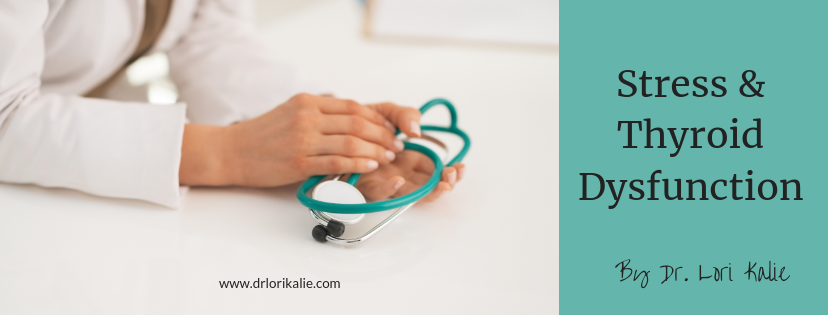Your thyroid gland proves that dynamite comes in small packages. Incredibly small but very influential, your thyroid can wreak havoc throughout your body when it is not operating properly.
Who is most at risk for either an under-active or overactive thyroid? Women are 4 times as likely as men to develop hypothyroidism and Hashimoto’s, which is an autoimmune disease of the thyroid gland. In the United States alone that means somewhere around 25 million women will experience some type of thyroid dysfunction.
In many cases, this is caused by stress.
Chronic Stress Can Lead to Hypothyroidism
Stress is a normal human reaction. It keeps us safe. It lets you know when there are dangers in your environment. However, chronic stress, unrelenting and frequent, can cause a number of health conditions. This is because of your adrenal glands and how they influence thyroid health. Your adrenals are two small glands that look like walnuts and sit on top of your two kidneys. They secrete cortisol, norepinephrine, epinephrine and other hormones that help you regulate a stress response.
If you are constantly running late, worry about financial problems all of the time, argue with your spouse or experience any other type of stress that is frequent, you negatively affect your adrenal glands. You suffer hormonal imbalances, and this is what causes the emotions linked to stress and anxiety. Physical stress like drastic swings in your blood sugar level, problems in your gut, environmental pollutions, inflammation and chronic infections can also weaken your adrenal process, and cause an under-active thyroid as a result.
Stress and Hyperthyroidism

Hyper is the opposite of hypo. A hyperactive person is full of energy and always on the go, and hyperthyroidism means you are producing an excess of thyroid hormones. As mentioned above, there are all kinds of stress people encounter these days. You may suffer the physical stress of an injury, or the emotional stress of a broken relationship.
Just as with hypothyroidism, this can negatively affect the amount of stress hormones released by your adrenal glands. Oddly enough, chronic stress can cause hypothyroidism and hyperthyroidism. When the stress levels are high and continuous, rather than occurring intermittently, your body is continuously releasing high levels of stress hormones. This causes your thyroid to respond by pumping out more hormones as well, and you develop hyperthyroidism.
You probably don’t need anyone to tell you that a lot of stress is not good for you. Since your thyroid is directly related to your metabolism and the proper functioning of your liver, kidneys, brain, heart and other organs, limiting stress is important for overall health and well-being.
Download my FREE e-book, “Love Your Thyroid”. You will learn about foods and supplements that will nourish your thyroid and help to reverse your thyroid condition. Download here.
Join my free Facebook group “Improving Thyroid Health” for help with reversing thyroid conditions here.
Follow me on social media to get more health tips!
Find me on Facebook here.
I’m on Instagram everyday. I post many, many health tips and inspiration a couple of times a day here. Plus, I have fun on Insta Stories! Follow me here.My Pinterest boards have many great thyroid tips and healthy recipes. Follow me here.







